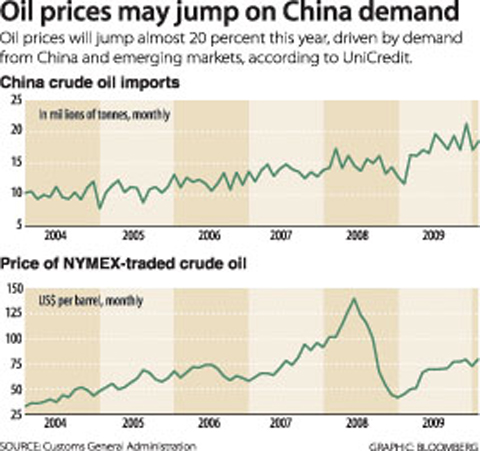Commodities mainly fell this week as traders digested an EU plan to tackle the Greek debt crisis, alongside news of moderately weaker economic growth in the US, a key consumer.
“Most commodity markets [were] lower, weighed primarily by broader market concerns,” Barclays Capital analysts said in a research note to clients.
“Lingering concerns on sovereign risk in the euro area and a smattering of mixed US macro-economic data have all affected the trajectory of commodity price movements,” they added.

OIL: Prices fell at the start of the week, before attempting a brief recovery as the US dollar weakened, but drifted lower on Friday as traders mulled the Greek rescue deal and the US economic growth outlook.
Oil had fallen earlier in the week as traders also tracked US demand worries as a government inventory report showed a jump in American crude inventories.
The US government’s Department of Energy said in its weekly inventory report on Wednesday that crude oil inventories rose 7.2 million barrels last week, confounding expectations of an increase of 1.7 million barrels.
By late on Friday on the New York Mercantile Exchange, Texas light sweet crude for delivery in May sank to US$79.82 compared with US$80.29 a week earlier for the expired April contract.
On London’s IntercontinentalExchange, Brent North Sea crude for May delivery dipped to US$79.05 from US$79.66 a week earlier.
PRECIOUS METALS: The prices of all precious metals declined.
By Friday on the London Bullion Market, gold eased to US$1,096 an ounce from US$1,105 the previous week.
Silver dipped to US$16.85 an ounce from 17.31.
On the London Platinum and Palladium Market, platinum edged down to US$1,596 an ounce from US$1,617.
Palladium fell to US$458 an ounce from US$476.
BASE METALS: Base or industrial metals diverged, despite growing hopes of a recovery in demand.
“There is a growing body of evidence to suggest that the biggest ever recovery in global base metals demand is taking shape,” Barclays Capital analysts said.
“Skepticism over the sustainability of this recovery and, in some cases, total blind-sidedness over any recovery at all, means that prices have yet to fully reflect what are turning into very positive demand dynamics indeed,” they said.
By Friday on the London Metal Exchange, copper for delivery in three months rose to US$7,512 a tonne from US$7,419 the previous week. Three-month aluminum dropped to US$2,230 a tonne from US$2,252.
GRAINS AND SOYA: Grains and soya prices weakened.
By Friday on the Chicago Board of Trade, maize for delivery in May dipped to US$3.57 a bushel from US$3.74 the previous week.
May-dated soyabean meal — used in animal feed — dropped to US$9.45 from US$9.61.
Wheat for May was down to US$4.66 a bushel from US$4.83.

FALSE DOCUMENTS? Actor William Liao said he was ‘voluntarily cooperating’ with police after a suspect was accused of helping to produce false medical certificates Police yesterday questioned at least six entertainers amid allegations of evasion of compulsory military service, with Lee Chuan (李銓), a member of boy band Choc7 (超克7), and actor Daniel Chen (陳大天) among those summoned. The New Taipei City District Prosecutors’ Office in January launched an investigation into a group that was allegedly helping men dodge compulsory military service using falsified medical documents. Actor Darren Wang (王大陸) has been accused of being one of the group’s clients. As the investigation expanded, investigators at New Taipei City’s Yonghe Precinct said that other entertainers commissioned the group to obtain false documents. The main suspect, a man surnamed

DEMOGRAPHICS: Robotics is the most promising answer to looming labor woes, the long-term care system and national contingency response, an official said Taiwan is to launch a five-year plan to boost the robotics industry in a bid to address labor shortages stemming from a declining and aging population, the Executive Yuan said yesterday. The government approved the initiative, dubbed the Smart Robotics Industry Promotion Plan, via executive order, senior officials told a post-Cabinet meeting news conference in Taipei. Taiwan’s population decline would strain the economy and the nation’s ability to care for vulnerable and elderly people, said Peter Hong (洪樂文), who heads the National Science and Technology Council’s (NSTC) Department of Engineering and Technologies. Projections show that the proportion of Taiwanese 65 or older would

Democracies must remain united in the face of a shifting geopolitical landscape, former president Tsai Ing-wen (蔡英文) told the Copenhagen Democracy Summit on Tuesday, while emphasizing the importance of Taiwan’s security to the world. “Taiwan’s security is essential to regional stability and to defending democratic values amid mounting authoritarianism,” Tsai said at the annual forum in the Danish capital. Noting a “new geopolitical landscape” in which global trade and security face “uncertainty and unpredictability,” Tsai said that democracies must remain united and be more committed to building up resilience together in the face of challenges. Resilience “allows us to absorb shocks, adapt under

Taiwan Semiconductor Manufacturing Co (TSMC, 台積電) yesterday said it is building nine new advanced wafer manufacturing and packaging factories this year, accelerating its expansion amid strong demand for high-performance computing (HPC) and artificial intelligence (AI) applications. The chipmaker built on average five factories per year from 2021 to last year and three from 2017 to 2020, TSMC vice president of advanced technology and mask engineering T.S. Chang (張宗生) said at the company’s annual technology symposium in Hsinchu City. “We are quickening our pace even faster in 2025. We plan to build nine new factories, including eight wafer fabrication plants and one advanced